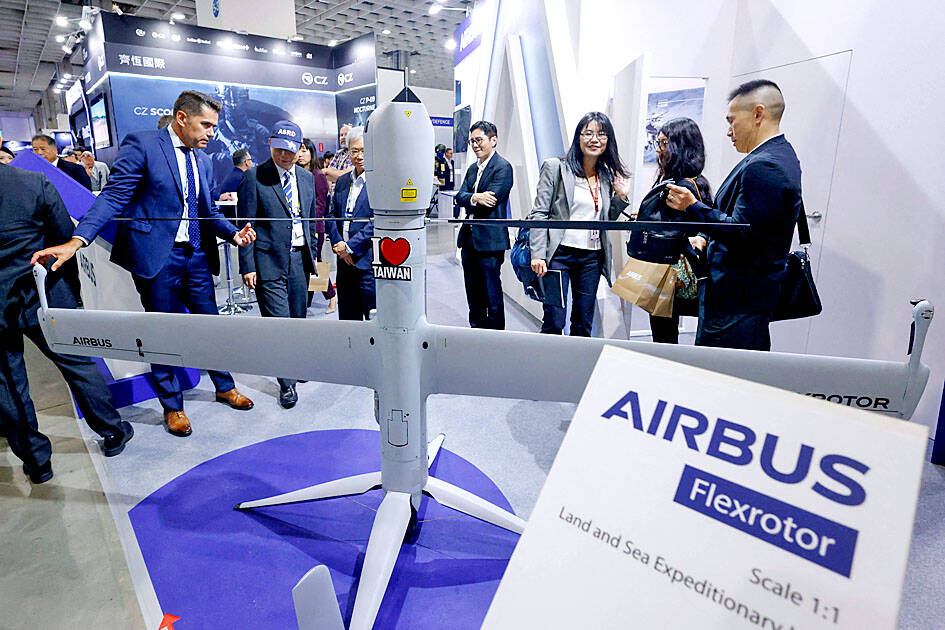In an arms market long dominated by the US, Europe raised its profile at Taiwan’s largest defense show last week as countries there took tentative steps to help the nation deal with an increasingly aggressive China.
Taipei has traditionally relied on the US for most of its arms purchases, with no major orders from Europe for three decades due to the fear of incurring the wrath of Beijing, which views the nation as its own territory. Taiwan rejects China’s sovereignty claims and says only Taiwanese can decide their future.
While many countries, especially in Europe, are nervous about any defense cooperation with Taiwan due to fears of Chinese retaliation, Taipei has found an increasingly sympathetic ear in parts of central and eastern Europe, especially since Russia invaded Ukraine in 2022.

Photo: Ann Wang, Reuters
Minister of National Defense Wellington Koo (顧立雄) visited the Czech pavilion at last week’s Taipei Aerospace and Defense Technology Exhibition, where he was greeted by Pavel Fischer, chairman of the Czech Senate’s Foreign Affairs, Defense and Security Committee.
“Today in Taiwan we have many partners to work with,” Fischer said. “We know the complexity of Taiwan in the international arena, because of the active measures by the Communist Party of China.”
The German Trade Office Taipei took part in the exhibition for the first time, saying it was “presenting Germany’s innovative achievements and industrial strength in the fields of aerospace and security.”
Airbus, also debuting at the show, had a large Flexrotor tactical vertical take-off and landing drone on display, designed for intelligence, surveillance and reconnaissance missions of up to 14 hours. The model had a sticker that read: “I heart Taiwan.”
An Airbus spokesperson said its stand was promoting products and services beyond commercial aircraft.
“These include helicopter applications for supporting search and rescue missions, emergency services and law enforcement, as well as secure communications services,” they said.
In a further sign of Europe being less nervous about interactions with Taipei, Minister of Foreign Affairs Lin Chia-lung (林佳龍) this month visited Prague, Rome and Vienna. Chinese Minister of Foreign Affairs Wang Yi (王毅) was in Austria just a week prior to Lin.
US companies remained a major presence at the show, including Lockheed Martin, which makes the F-16 jets, the mainstay of Taiwan’s air force. In contrast, Europe has not provided Taipei with big-ticket items for about three decades.
When the Netherlands sold Taiwan two submarines in the 1980s, China was so infuriated that the Dutch government subsequently promised not to allow any more arms sales to Taiwan.
In 1991, France sold Taiwan six frigates, and 60 Mirage jets the next year. It has not sold Taipei any other major weapons systems since.
Still, the UK is involved in helping Taiwan build its first indigenous submarines.
“There is much less caution now. The world has changed because of Ukraine,” said one executive at a Taiwanese military-use drone manufacturer that works with European partners, asking not to be identified for security reasons.

Three Taiwanese airlines have prohibited passengers from packing Bluetooth earbuds and their charger cases in checked luggage. EVA Air and Uni Air said that Bluetooth earbuds and charger cases are categorized as portable electronic devices, which should be switched off if they are placed in checked luggage based on international aviation safety regulations. They must not be in standby or sleep mode. However, as charging would continue when earbuds are placed in the charger cases, which would contravene international aviation regulations, their cases must be carried as hand luggage, they said. Tigerair Taiwan said that earbud charger cases are equipped

UNILATERAL MOVES: Officials have raised concerns that Beijing could try to exert economic control over Kinmen in a key development plan next year The Civil Aviation Administration (CAA) yesterday said that China has so far failed to provide any information about a new airport expected to open next year that is less than 10km from a Taiwanese airport, raising flight safety concerns. Xiamen Xiangan International Airport is only about 3km at its closest point from the islands in Kinmen County — the scene of on-off fighting during the Cold War — and construction work can be seen and heard clearly from the Taiwan side. In a written statement sent to Reuters, the CAA said that airports close to each other need detailed advanced

Tropical Storm Fung-Wong would likely strengthen into a typhoon later today as it continues moving westward across the Pacific before heading in Taiwan’s direction next week, the Central Weather Administration (CWA) said. As of 8am, Fung-Wong was about 2,190km east-southeast of Cape Oluanpi (鵝鑾鼻), Taiwan’s southernmost point, moving westward at 25kph and possibly accelerating to 31kph, CWA data showed. The tropical storm is currently over waters east of the Philippines and still far from Taiwan, CWA forecaster Tseng Chao-cheng (曾昭誠) said, adding that it could likely strengthen into a typhoon later in the day. It is forecast to reach the South China Sea

WEATHER Typhoon forming: CWA A tropical depression is expected to form into a typhoon as early as today, the Central Weather Administration (CWA) said yesterday, adding that the storm’s path remains uncertain. Before the weekend, it would move toward the Philippines, the agency said. Some time around Monday next week, it might reach a turning point, either veering north toward waters east of Taiwan or continuing westward across the Philippines, the CWA said. Meanwhile, the eye of Typhoon Kalmaegi was 1,310km south-southeast of Oluanpi (鵝鑾鼻), Taiwan’s southernmost point, as of 2am yesterday, it said. The storm is forecast to move through central